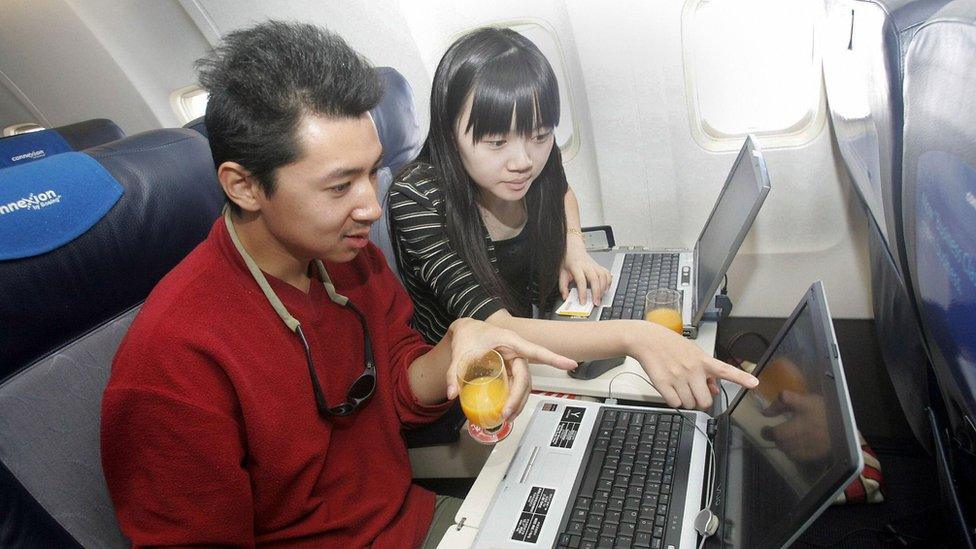UK flight ban on electronic devices announced
- Published
- comments

The UK ban applies to direct inbound flights from six countries; the US ban lists eight countries
The UK government has announced a cabin baggage ban on laptops and tablets on direct flights to the UK from Turkey, Lebanon, Jordan, Egypt, Tunisia and Saudi Arabia.
The ban follows a similar move in the US, where officials say bombs could be hidden in a series of devices.
Downing Street said it was "necessary, effective and proportionate".
The government has not given a start-date for the ban, but says airlines are "in the process of implementing it".
The ban applies to any device larger than 16cm long, 9.3cm wide or 1.5cm deep. It includes smart phones, but most fall inside these limits.
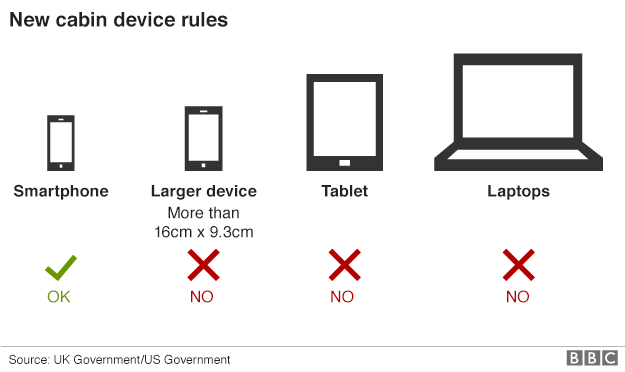
Any affected device, including e-readers, will need to be placed into hold luggage.
Passengers can still take most smartphones, games consoles and DVD players onto the plane, a government spokeswoman said.
Number 10 said it was up to individual airlines to decide when to begin enforcing the ban and passengers should contact their airline for more information.

Which airlines are affected?
Six UK carriers:
Eight overseas carriers:

Transport Secretary Chris Grayling said: "We understand the frustration that these measures may cause and we are working with the aviation industry to minimise any impact."
Air industry consultant John Strickland said the ban would cause "headaches for airlines and customers", but carriers had "no choice but to put security first".
Simon Calder, travel editor of the Independent, told the BBC the ban would particularly affect passengers who booked cheaper, hand luggage-only tickets, but would now have to pay to check a bag in.
He added that about 1,000 UK-bound passengers used Turkish Airlines every day to fly from long-haul destinations and would also be affected as their planes were routed via Istanbul.
While the US government cited unspecified "threats" in its announcement, the prime minister's official spokesman declined to discuss whether the new rules were prompted by specific intelligence.
Why are gadgets banned but mobiles ok? Daniel Sandford explains
The US ban applies to flights from 10 airports in eight countries. Nine airlines are affected - Royal Jordanian, EgyptAir, Turkish Airlines, Saudi Arabian Airlines, Kuwait Airways, Royal Air Maroc, Qatar Airways, Emirates and Etihad Airways.
Asked why the US ban differed from the UK, Theresa May's spokesman said: "We have each taken our own decisions."

A sign of mounting concern
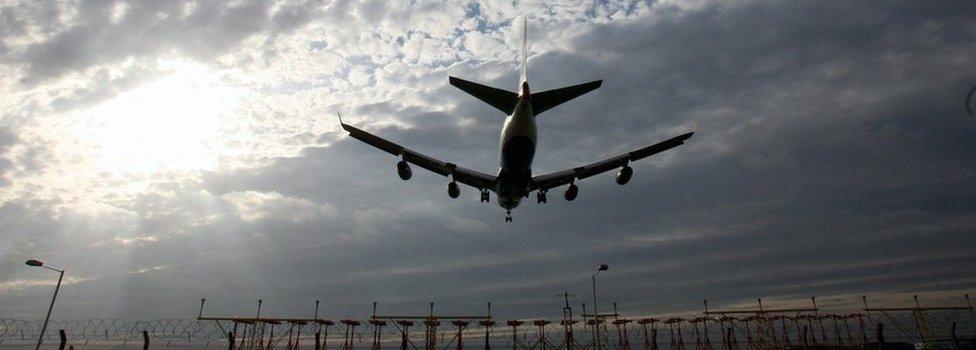
By Frank Gardner, BBC security correspondent
This is a controversial decision, and, I'm told, not an easy one for the government.
The UK ban goes even further than the US move which does not affect national carriers.
It is not the result of a specific, identified terrorist plot, but of mounting concern in US and British intelligence circles at the ongoing interest amongst jihadist groups in the Middle East in blowing up a passenger plane in mid-air.
There are some in Whitehall who fear this may be an over-reaction, with damaging commercial and diplomatic consequences. But others have pointed to last year's laptop bomb smuggled onto a flight from Somalia by insurgents from Al-Shabaab.
The year before, so-called Islamic State blew up a Russian passenger plane over the Sinai Peninsula. But that bomb was hidden in the hold, where laptops and other devices will still be allowed.
The editor of Aviation Security International, Philip Baum, told the BBC that "encouraging people to check laptops, and other such items, into the luggage hold simply makes the challenge of screening even harder".

For more than two years, the official UK threat level for international terrorism has stood at severe, meaning an attack is "highly likely".
In July 2014, passengers at UK airports were advised to ensure electronic devices were charged so they could be switched on for security checks.
The ban on liquids over 100ml in hand luggage - introduced after a foiled 2006 plot to blow up planes using explosives hidden in drink bottles - also remains in place.
'Evaluated intelligence'
The US has given airlines 96 hours, beginning at 07:00 GMT on Tuesday, to implement its ban, which officials said had no end date.
Passengers on some 50 flights a day from some of the busiest hubs in the Middle East, Turkey and North Africa will be affected.
The Turkish government has said the US ban is wrong and should be reversed.
But the Department of Homeland Security said extremists were seeking "innovative methods" to bring down jets.
Citing the Somalia incident in February 2016, as well as the 2015 downing of a Russian airline in Egypt and attacks at airports in Brussels and Istanbul, it added: "Evaluated intelligence indicates that terrorist groups continue to target commercial aviation, to include smuggling explosive devices in various consumer items."

Which airports are affected by the US ban?
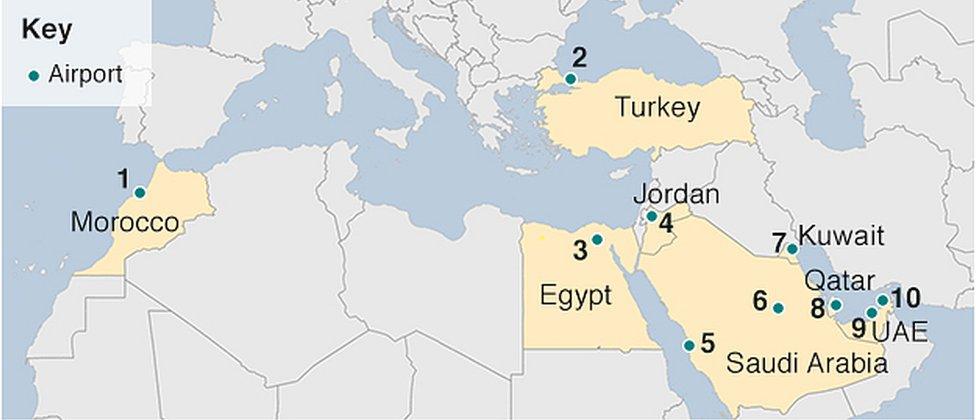
Mohammed V International, Casablanca, Morocco
Ataturk Airport, Istanbul, Turkey
Cairo International Airport, Egypt
Queen Alia International, Amman, Jordan
King Abdulaziz International, Jeddah, Saudi Arabia
King Khalid International, Riyadh, Saudi Arabia
Kuwait International Airport
Hamad International, Doha, Qatar
Abu Dhabi International, United Arab Emirates
Dubai International, United Arab Emirates


- Published21 March 2017
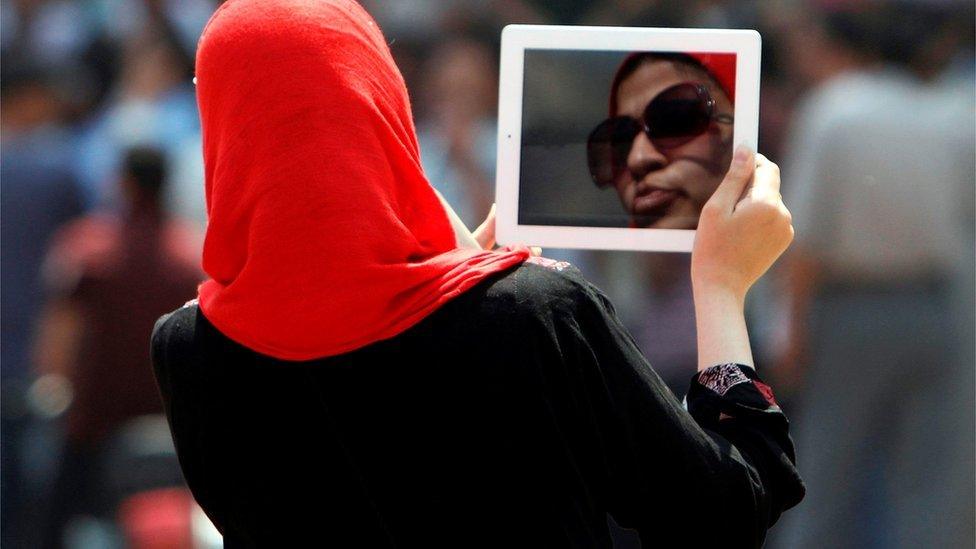
- Published22 March 2017
